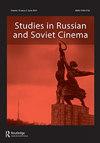The waning of the young sincere hero in Averbakh and Maslennikov’s The Private Life of Kuziaev Valentin
IF 0.4
0 FILM, RADIO, TELEVISION
引用次数: 0
Abstract
ABSTRACT The article discusses the 1967 film The Private Life of Kuziaev Valentin, directed by Il’ia Averbakh and Igor’ Maslennikov. The film belongs to the Thaw period of Soviet filmmaking, defined by cineastes’ pledge to sincerity. This idea aligned with the cultural transformations launched by the Khrushchev administration at the end of the 1950s, which encompassed radical changes in the attitudes and behaviour of the Soviet youth. Sensitive to the current political climate, Soviet filmmakers populated their narratives with the new, honest and self-reflective young heroes. Our detailed analysis of The Private Life of Kuziaev Valentin demonstrates how it critically interrogates and destabilises the popular sincerity discourse of the time. Engaging in a complex dialogue with Marlen Khutsiev’s iconic 1962 production Ilyich’s Gate, the film also foreshadows the imminent appearance, on the Soviet screen, of a radically different character. In the 1970s, the introspective flaneurs of the Thaw are slowly replaced by their cynical and shallow, two-dimensional copies. Remarkably, this evolution of the contemporary protagonist coincided with similar tendencies in French and British cinema.阿弗巴赫和马斯伦尼科夫的《库齐亚耶夫·瓦伦丁的私生活》中年轻真诚的英雄的衰落
摘要本文讨论了1967年由伊莉亚·阿夫巴克和伊戈尔·马斯伦尼科夫执导的电影《库齐亚夫·瓦伦丁的私生活》。这部电影属于苏联电影制作的陶时代,其定义是电影制作人对真诚的承诺。这一想法与赫鲁晓夫政府在20世纪50年代末发起的文化变革相一致,其中包括苏联青年态度和行为的根本改变。苏联电影制作人对当前的政治气候很敏感,他们的叙事中充满了新的、诚实的、自我反思的年轻英雄。我们对《库齐亚夫·瓦伦丁的私生活》的详细分析表明,它如何批判性地质疑和破坏当时流行的真诚话语。这部电影与马伦·库齐耶夫1962年的标志性作品《伊里奇之门》进行了复杂的对话,也预示着一个截然不同的角色即将出现在苏联银幕上。在20世纪70年代,陶的内省侧卫慢慢被他们愤世嫉俗、肤浅的二维复制品所取代。值得注意的是,当代主人公的这种演变与法国和英国电影中的类似趋势不谋而合。
本文章由计算机程序翻译,如有差异,请以英文原文为准。
求助全文
约1分钟内获得全文
求助全文

 求助内容:
求助内容: 应助结果提醒方式:
应助结果提醒方式:


